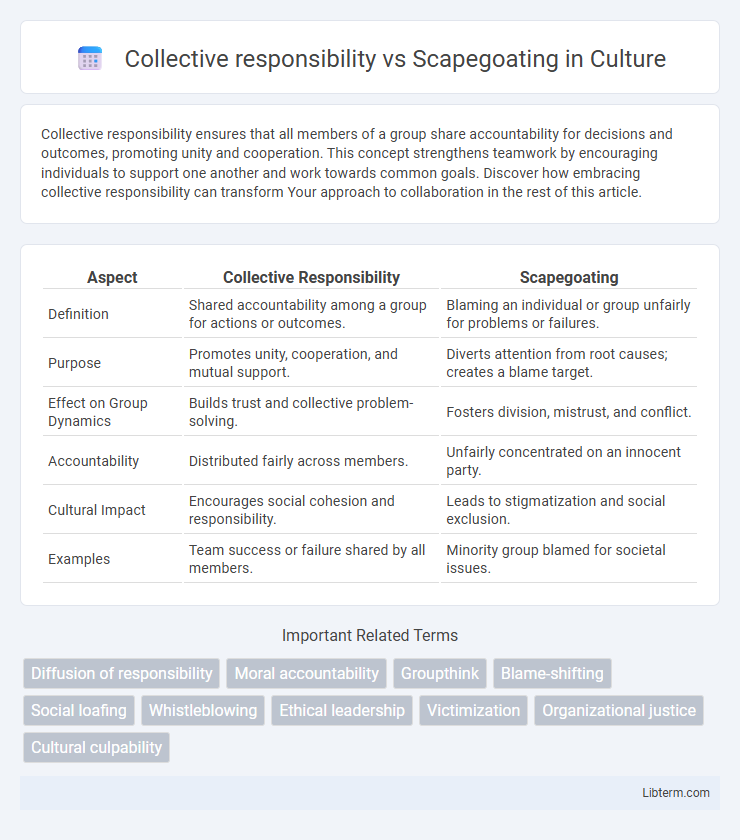Collective responsibility ensures that all members of a group share accountability for decisions and outcomes, promoting unity and cooperation. This concept strengthens teamwork by encouraging individuals to support one another and work towards common goals. Discover how embracing collective responsibility can transform Your approach to collaboration in the rest of this article.
Table of Comparison
| Aspect | Collective Responsibility | Scapegoating |
|---|---|---|
| Definition | Shared accountability among a group for actions or outcomes. | Blaming an individual or group unfairly for problems or failures. |
| Purpose | Promotes unity, cooperation, and mutual support. | Diverts attention from root causes; creates a blame target. |
| Effect on Group Dynamics | Builds trust and collective problem-solving. | Fosters division, mistrust, and conflict. |
| Accountability | Distributed fairly across members. | Unfairly concentrated on an innocent party. |
| Cultural Impact | Encourages social cohesion and responsibility. | Leads to stigmatization and social exclusion. |
| Examples | Team success or failure shared by all members. | Minority group blamed for societal issues. |
Understanding Collective Responsibility
Collective responsibility emphasizes the shared accountability of a group for actions and outcomes, fostering unity and cooperation essential for organizational success and social cohesion. It involves mutual trust and collective problem-solving, enabling members to support each other rather than assigning blame. Understanding collective responsibility helps prevent scapegoating, which unfairly targets individuals, undermining morale and impeding effective resolution of issues.
Defining Scapegoating in Society
Scapegoating in society refers to the unfair practice of blaming an individual or group for problems or failures without considering the broader systemic issues or collective responsibilities involved. This phenomenon often targets marginalized communities, reinforcing social divisions and deflecting accountability from those in power. Unlike collective responsibility, which promotes shared accountability and cooperative problem-solving, scapegoating undermines social cohesion by fostering resentment and injustice.
Historical Perspectives: Collective Accountability
Historical perspectives on collective accountability reveal how societies have assigned responsibility to entire groups for actions or events, often leading to collective punishment or societal reform. Collective responsibility has been institutionalized in various legal and cultural norms, reinforcing social cohesion but sometimes resulting in unfair scapegoating of marginalized communities. Examining these patterns across different civilizations highlights the tension between holding groups accountable and the dangers of oversimplified blame.
Psychological Roots of Scapegoating
Scapegoating originates from deep psychological mechanisms such as projection, where individuals attribute their own unwanted feelings or failures onto others to reduce internal conflict. This behavior often arises in high-stress group dynamics, serving as a defense mechanism to maintain group cohesion by collectively targeting a vulnerable individual or subgroup. Unlike collective responsibility, which promotes shared accountability and problem-solving, scapegoating deflects blame and undermines trust, perpetuating cycles of fear and social division.
The Impact of Collective Responsibility on Group Dynamics
Collective responsibility fosters accountability within groups, enhancing cooperation and trust by ensuring all members share the consequences of their actions. This dynamic reduces scapegoating, where individuals unfairly blame others to avoid personal blame, thereby promoting a more cohesive and resilient group environment. Emphasizing shared responsibility strengthens group solidarity and encourages positive conflict resolution.
Dangers and Consequences of Scapegoating
Scapegoating often leads to unjust blame on individuals or groups, resulting in social division, increased conflict, and undermined trust within communities or organizations. This misdirected accountability diverts attention from genuine systemic issues, preventing effective problem-solving and reinforcing harmful stereotypes or discrimination. The dangers include escalated tensions, marginalization, and a weakened sense of collective responsibility, which hampers cooperation and long-term resilience.
Collective Responsibility in Modern Organizations
Collective responsibility in modern organizations fosters teamwork by ensuring all members share accountability for outcomes, promoting transparency and mutual support. This approach enhances organizational resilience and drives consistent performance by aligning individual goals with team objectives. Emphasizing collective responsibility reduces internal conflict and prevents the harmful effects of scapegoating, where blame is unjustly assigned to individuals.
Strategies to Prevent Scapegoating
Implement clear communication channels to foster transparency and accountability within groups, reducing misunderstandings that lead to scapegoating. Encourage a culture of shared responsibility by promoting team-based problem-solving and recognizing collective achievements, which diminishes the tendency to single out individuals for blame. Implement conflict resolution training and establish protocols that address issues constructively, preventing the unfair targeting of scapegoats in organizational or social settings.
Building a Culture of Accountability
Building a culture of accountability emphasizes collective responsibility, where every team member actively contributes to outcomes and supports shared goals. This approach fosters transparency and mutual trust, reducing the likelihood of scapegoating, which undermines morale and hinders problem-solving. Prioritizing clear communication, fair evaluation, and constructive feedback strengthens group cohesion and drives continuous improvement.
Collective Responsibility vs Scapegoating: Key Differences
Collective responsibility entails shared accountability among group members for actions and outcomes, promoting unity and cooperation. In contrast, scapegoating unfairly assigns blame to an individual or subgroup, diverting attention from underlying issues and hindering problem resolution. Understanding these key differences is crucial for fostering ethical accountability and preventing social division within organizations or communities.
Collective responsibility Infographic

 libterm.com
libterm.com